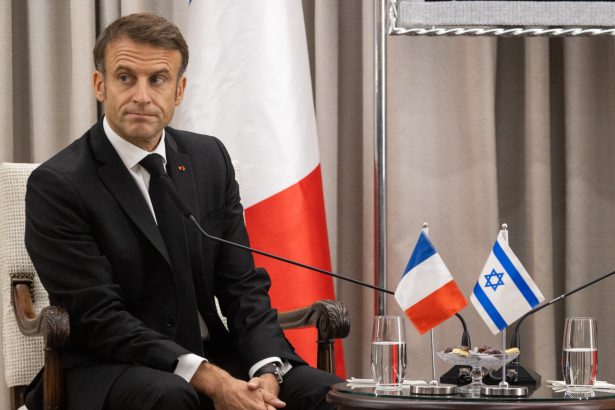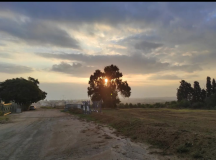Sam Shube critiques French President Macron’s recent foray into Israeli-Palestinian peacemaking. Attempts to kickstart two state negotiations, Shube argues, are both doomed to failure and dangerous, in ignoring – and possibly even further enabling – one of the key obstacles to peace: the Israeli settlement enterprise. ‘Rolling back the settlements,’ he suggests, ‘cannot wait until Palestinian nationalism accepts Zionism and Israel embraces Palestinian statehood.’
The Morbid Colors of Hope
It’s a ten-minute drive along the northern edge of the Gaza Envelope to the locally acclaimed plant nursery at Moshav Netiv HaAsara. My partner once indulged in monthly rounds of shopping therapy amidst its endless rows of flora, but we hadn’t been here since that dark watershed in our lives almost two years ago. Now it evoked grim memories of the days following 7 October, when Facebook’s unfathomable algorithm greeted me with cheerful graphics of jubilant Palestinians – children running on the Temple Mount/Haram al-Sharif, multi-colored kites flying overhead, or a rainbow-coloured hang glider. It was triumphalism bordering on the insane. The colour technique resembled the iconic ‘Hope’ poster of Barack Obama designed by American artist Shepard Fairey.
Netiv HaAsara is where those handgliders landed, carrying heavily-armed killers over the border wall to the site of their deadly mission. Twenty members of this moshav were slaughtered that day, including our friends and one-time landlords, Bilha and Yaakobi Yinon, burned to death in their home. Their son, Maoz Yinon, remains a diehard and vocal advocate for Palestinian-Israeli peace. To Maoz, I can only bow my head in admiration. As for me, I slide my Glock into the back of my trousers and stick an extra clip of 9mm bullets into my front pocket before getting in the car. Just in case.
Off the Agenda
Emanuel Macron’s quixotic foray into the wilderness of Palestinian state diplomacy (PSD) (announced shortly before the outbreak Israeli-Iranian hostilities and since put on hold) forms a disconnected and forlorn backdrop to our trip – and to the present state of Israeli society writ large. It’s not just Israel’s legitimate fears that make Palestinian statehood a dead letter at this point in time, but the rightward shift in public sentiment and the mainstreaming of extreme nationalism hitherto considered beyond the pale. A recent survey by researchers from the University of Maryland and Penn State found that, over 600 days into an exceptionally deadly war led by a government of racial supremacists, most Israeli Jews support the forced expulsion of Gaza’s Palestinians.[1] The former CEO of Naftali Bennet’s Yamina party shamelessly refers to a ‘terrorist in an incubator’ when discussing children in Gazan hospitals on Channel 13 news[2]. Popular news analyst Zvi Yehezkeli repeatedly insists that Israel should have killed 100,000 Gazans in the opening salvo of the war. And Likud MK Boaz Bismuth matter-of-factly opines that ‘there are no innocents in Gaza’. Not a single centrist politician has broached the idea of a Palestinian State in recent memory .
No, Palestinian independence will not be on the agenda of any Israeli government in the foreseeable future, no matter what its ideological makeup. The utter futility of Macron’s initiative would be almost endearing in its naïve misreading of the political map, were it not for the real and present danger it represents to Israeli democracy and Palestinian human rights alike.
A Perilous Diplomacy
To be sure, there is good reason to fear an independent Palestine bordering the demographic and economic heartland of Israel’s coastal strip, or the long-suffering communities of the Western Negev. After all, IDF withdrawals from Gaza in 2005, Lebanon in 2000, and parts of the West Bank in the 1990s degenerated into the military and humanitarian disasters of Hamas, Hezbollah, and the Second Intifada. But the true danger of Palestinian state diplomacy (PSD) as promoted by Macron is more perilous than yet another calculated gamble on national security. Since Oslo, PSD has served as political cover for the inexorable expansion of settler apartheid on the West Bank.
More out of fear than by design, Israeli peace governments have repeatedly bought social stability at home by tolerating the dispossession of Palestinians. Rabin and Peres deferred the question of settlements until final status negotiations that never materialised. Ehud Barak brought the settler-backed National Religious Party into his coalition, hoping the peace process would ultimately vitiate any gains the settlers made under the protection of the IDF. The international community, meanwhile – easily assuaged by the sight of Israeli and Palestinian negotiators exchanging pleasantries in a hotel lobby or sipping espresso at a conference – has long been gripped by a millenarian hope that PSD will somehow curb the relentless proliferation of what are now 150 settlements and 120 unofficial outposts. Israel realised long ago that it could have both.
Lunch with Arafat
There is, of course, another reason PSD has proven to be an interminable exercise in avoidance: the unwillingness – or inability – of Palestinian leaders to genuinely pursue a two-state solution. I still remember meeting Yasser Arafat at his headquarters in Gaza. It was the early 1990s, during the heady days of Oslo. The aging PLO chairman invited a delegation of about a dozen activists from Israel’s Labor Party Young Guard to meet him for a photo op and lunch at a seaside restaurant. I remember his olive-green uniform, the pens in his shirt pocket, and my own sense that we were both on the same side. Like some old-time Labor Zionist, Arafat was now ‘one of us,’ a trusted, veteran comrade. Perhaps he even knew some Yiddish.
By mid-decade, after a series of deadly terror attacks – despite ongoing negotiations with the Rabin government – I felt betrayed and confused by what seemed to be his criminal inaction. I should not have been. As Ronen Bergman has documented,[3] Arafat consistently exploited the Oslo Accords to arm multiple militias and generously financed the paroxysm of terrorism that drove Israel to the brink of chaos in 2000. Abu Mazen, meanwhile, his designated successor, watched helplessly as Hamas expelled the Palestinian Authority from Gaza soon after Israel withdrew, quickly defeating PA security forces and murdering its loyalists. It can be plausibly argued that the presence of Israeli occupation troops is what keeps Palestinian supporters of the two-state solution in power, and its opponents out. Tragically, it is also what protects and enables the settlement enterprise.
An Essential Distinction
Discourse on the West Bank often conflates settlements with the national defence,[4] positing them as the only alternative to territorial withdrawal and, consequently, a necessary bulwark of security on Israel’s eastern flank. This is logically specious and factually incorrect. Mobile homes in Maale Michmash or Shvut Rachel cannot stop enemy tank columns. In an emergency they’d simply be evacuated like Israeli settlements were on the Golan in the Yom Kippur War. And if the baby carriages and kindergartens are not necessary for the IDF to deploy anywhere in the territories it deems necessary, the converse assumption – that if settlements go, so must the troops – is equally baseless. The Gaza disengagement was a tragic case in point. Why did Israel have to abandon control over the Rafah border with Egypt just to vacate civilians from Gush Katif? Why did it have to dismantle IDF Gaza Command in order to close the settlement of Morag? There was no logical connection between the two. Neither is there one on the West Bank.
Miracles and Hilltop Outposts
In an important new book,[5] Israeli human rights lawyer Michael Sfard provides a terse but comprehensive review of the settlement juggernaut, how it violates the Geneva Convention, and eschews the internationally accepted rules that distinguish military occupation from apartheid. He illustrates the systematic violation of Palestinian person and property by settler gangs, with the tacit agreement of Israel’s security forces. And he persuasively argues that the settlements have contributed to the very extremist tendencies in Israeli politics mentioned above, leading – inevitably and inexorably – to the Netanyahu government’s assault on Israel’s democratic institutions and civil society organizations. ‘Occupation and apartheid,’ writes Sfard, ‘are the steroids of the constitutional coup.’
The present government, meanwhile, has put the settlement enterprise itself on steroids, openly declaring its desire for de jure sovereignty and abandoning the pretence of military occupation by transferring the army’s powers on the West Bank to civilian authorities. The Palestinians, of course, have borne the brunt of it all. As Hagar Sheizaf reports in Haaretz, 78 communities and extended families have been driven out of their homes by settler violence and intimidation since 2022, and 37 new hilltop outposts now command an additional 387,000 dunams of land on the West Bank.[6]
Since October 2023, fighting in Gaza has diverted attention from the West Bank annexation drive, prompting settler MK Orit Strock to call it ‘a time of miracles’. Once the inevitable ceasefire comes into effect, they’ll have to come up with some other smoke screen. Macron’s latest PSD initiative may fill the gap. Netanyahu or his likely successor (according to recent polls), one-time settler leader and former PM Naftali Bennett, may simply ignore the accession of Palestine to full UN member status. Alternately, Bibi may engage in his classic PSD delaying tactic: He’ll make a conciliatory remark at a press conference, mention the peace process in an interview with Le Monde, and instruct his UN ambassador to stand in line for coffee next to a Palestinian delegate. As the wheels of European diplomacy move into high gear, Israeli and Palestinian representatives will agree to attend a summit on confidence-building measures in the spring of 2026. In the interim, Knesset elections, a crisis with Turkey or Syria, or a new COVID outbreak will put it all on hold, while settlers throw together another 40 hilltop outposts.
Time to Roll Back Settlements
The pursuit of Palestinian statehood will not roll back settlements, though the reverse may be true. But even if terminating the settlement enterprise fails to produce an independent Palestine, it remains a matter of great urgency. A genuine concern for both Palestinian welfare and Israeli democracy requires that Europe reflect on the vast amount of financial and political capital it has squandered on Palestinian statehood diplomacy over the past generation, take a step back, and refocus its attention on what matters.
Settlements should not get a free pass in exchange for peace talks, and Israel should not be punished for Palestinian intransigence. As the history of negotiations over settlement blocs and land swaps demonstrated, the Green Line[7] need not define Israel’s contours under a future peace agreement. But democratic states must remind Israelis that a real and palpable geographic distinction still separates their sovereign democracy and the territories they militarily hold in trust on a temporary basis. Sanction Israeli businesses and industries with investments in the settlements – including banks that provide mortgages for settlers and construction companies that build their homes – while rewarding trade with Israeli firms that eschew business in the occupied territories. Intensify travel bans on violent settlers, while expanding tourist opportunities for normative Israelis. Deepen military cooperation with Israeli companies on electronic warfare and air defense systems, but ban the sale of small arms, such as Belgian FN machine guns, if they are used for routine security on the West Bank. Rolling back the settlements cannot wait until Palestinian nationalism accepts Zionism and Israel embraces Palestinian statehood.
These lines were written just prior to the outbreak of the air war with Iran. One may only hope that the tactical brilliance of Israel’s preemptive strike succeeds in changing the long-term strategic picture. When the dust finally settles, however, this country will discover that demographic realities on the West Bank have not disappeared. Nor have the pernicious effects of the settlement project. Rollback is an essential precondition for peace and democracy in the Middle East – here and now.
[1] Shay Hakani and Tamir Sorek, Israel Wants Expulsion, Yes to Transfer: 82% of Jewish Israelis Back Expelling Gazans, Haaretz Magazine, May 23,2025 https://www.haaretz.com/israel-news/2025-05-28/ty-article-magazine/.premium/yes-to-transfer-82-of-jewish-israelis-back-expelling-gazans/00000197-12a4-df22-a9d7-9ef6af930000.
[2] Alon Idan, Terrorist in an Incubator, Haaretz, June 11, 2025.
[3] Ronen Bergman, And Permission is Given: How the Palestinian Authority Became an Assembly Line for Corruption and Terror , Yediot Books, 2002 [Hebrew].
[4] In contrast to the theocratic messianism of settler leaders such as Bezalel Smotrich, the Israel Defense and Security Forum makes a military case for settlements. See https://idsf.org.il/en/.
[5] Michael Sfard, Occupied from Within: A Journey to the Roots of the Israeli Constitutional Coup. 2025, the Berl Katznelson Fund. [Hebrew]
[6] Hagar Sheizaf, The Expulsion of Palestinian Communities on the West Bank Reaches a Peak, Haaretz, June 7, 2025.
[7] Otherwise known as the 1949 Armistice Agreement lines. All parties, including the US and Palestinian negotiators at Camp David in 2000, have since recognised that some settlements will stay.



































